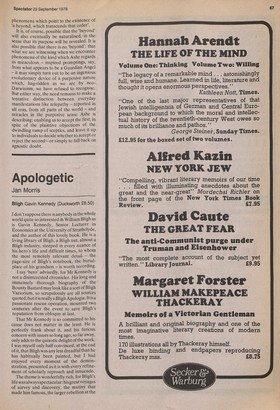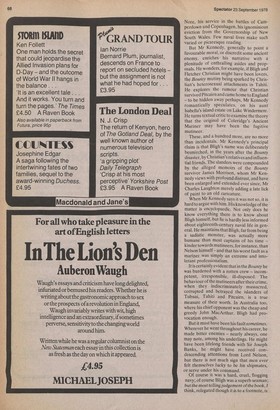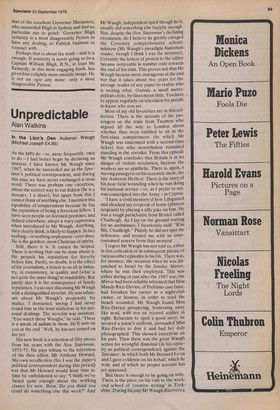Apologetic
Jan Morris
Bligh Gavin Kennedy (Duckworth £8.50)
I don't suppose there is anybody in the whole world quite so interested in William Bligh as is Gavin Kennedy, Senior Lecturer in Economics at the University of Strathclyde, and the author of this lovely book. He is a living library of Bligh, a Bligh nut, almost a Bligh industry, steeped in every nuance of his hero's life and difficult times, to whom the most remotely relevant detail — the page-size of Bligh's notebook, the burialplace of his grandson — is worth recording.
I say 'hero' advisedly, for Mr Kennedy is not a disinterested chronicler. His long and immensely thorough biography of the Bounty Bastard may look like a sort of Bligh Variorium, so scrupulously are all sources quoted, but it is really a Bligh Apologia. It is a passionate rescue operation, mounted two centuries after the event to save Bligh's reputation from obloquy at last.
That Mr Kennedy is so committed to his cause does not matter in the least. He is perfectly frank about it, and his furious concern with issues so long ago, so far away, only adds to the quixotic delight of the work. I was myself only half convinced, at the end of it, that Bligh was any less dreadful than he has habitually been painted, but I had enjoyed every moment of the demonstration, presented as it is with every refinement of scholarly reproach and innuendo.
The theme is wonderfully rich, for Bligh's life was always spectacular: his gre at voyages of survey and discovery, the mutiny that made him famous, the larger rebellion at the More, his service in the battles of Camperdown and Copenhagen, his ignominious eviction from the Governorship of New South Wales. Few naval lives make such varied or picaresque reading.
But Mr Kennedy, generally to point a favourable moral, or discredit some ancient enemy, enriches his narrative with a plenitude of enthralling asides and proposals. He wonders, for example, if Bligh and Fletcher Christian might have been lovers, the Bounty mutiny being sparked by Christian's heterosexual attachments in Tahiti. He explores the rumour that Christian survived Pitcairn and came home to England — to be hidden away perhaps, Mr Kennedy romantically speculates, on his aunt Isabella's island estate on Lake Windermere. He turns textual critic to examine the theory that the original of Coleridge's Ancient Mariner may have been the fugitive mutineer.
These, and a hundred more, are no more than incidentals. Mr Kennedy's principal claim is that Bligh's name was deliberately besmirched, in the years after the Bounty disaster, by Christian's relatives and influential friends. The slanders were compounded by the alleged memoirs of the Bounty survivor James Morrison, whom Mr Kennedy views with profound distrust, and have been enlarged and extended ever since, Mr Charles Laughton merely adding a late lick of paint to an old caricature. When Mr Kennedy says it was not so, it is hard to argue with him. His knowledge of the matter is encyclopaedic. Not only does he know everything there is to know about Bligh himself, but fie is hardly less informed about eighteenth-century naval life in general. He maintains that Bligh, far from being a sadistic monster, was actually more humane than most captains of his time — kinder towards mutineers, for instance, than Nelson himself— and that his worst fault as a mariner was simply an extreme and intolerant professionalism.
It is certainly evident that in the Bounty he was burdened with a rotten crew — incompetent, irresponsible, ill-disposed. The behaviour of the mutineers after their crime, when they indiscriminately massacred, corrupted and betrayed the islanders of Tubuai, Tahiti and Pitcairn, is a true measure of their worth. In Australia too, where his chief opponent was the cheap and greedy John MacArthur, Bligh had provocation enough.
But it must have been his fault sometimes. Wherever he went throughout his career, he made bitter enemies — nearly always, one may note, among his underlings. He might have been lifelong friends with Sir Joseph Banks, he might have received condescending attentions from Lord Nelson, but there is not much sign that men ever felt themselves lucky to be his shipmates, or serve under his command.
Of course it was a hard, cruel, flogging navy; of course Bligh was a superb seaman; but the most telling judgement of the book, I think, relegated though it is to a footnote, is that of the excellent Governor Macquarie, who succeeded Bligh in Sydney and had no particular axe to grind: 'Governor Bligh certainly is a most disagreeable Person to have any dealing, or Publick business to transact with . . .
Perhaps that is about the truth — and it is enough. If posterity is never going to love Captain William Bligh, R.N., at least Mr Kennedy, in this most engaging book, has given him aslightly more amiable image. He is not an ogre any more: only a most disagreeable Person.




































































































 Previous page
Previous page